ISA-SAWP Colombo 2026: Call for Proposals
Happy to announce the 1st ever @isanet.bsky.social conference in South Asia in August 2026. Hosted in Colombo, Sri Lanka, we welcome proposals from scholars based in and/or studying South Asian politics & international relations, but also broader global themes ofc www.isanet.org/Conferences/...
21.01.2026 07:59 — 👍 51 🔁 47 💬 13 📌 2
Client Challenge
Day3️⃣ of the NRMP 5th Anniversary Highlights🧁
From @audreyalejandro.bsky.social at @lsemethodology.bsky.social comes a topic that everyone can reflect on, #reflexivity. Learn more about your bias and applying these realizations to your research 👇 www.nature.com/articles/s43...
13.01.2026 17:48 — 👍 2 🔁 1 💬 0 📌 0
Crucial resource here from the world expert on reflexivity in social science research
08.01.2026 13:17 — 👍 3 🔁 1 💬 0 📌 0

Title: The future of reflexivity in practice: building a collective methodological agenda by Audrey Alejandro -Reflexivity is increasingly recognized as a cornerstone of high-quality research, yet methodological guidance on how to do reflexivity in practice remains limited. Drawing on emerging initiatives to operationalize reflexivity, three priorities for advancing a collective agenda are identified — turning reflexivity into a teachable, actionable set of methods.
🔭 What’s the future of reflexivity & how do we put it into practice? New article in @natrevmethodsprimers.nature.com
I argue for three priorities 1) evaluation criteria 2) studying reflexivity as a socio-cognitive phenomenon 3) adapting it across research traditions
OA: rdcu.be/eX79L
08.01.2026 12:22 — 👍 13 🔁 5 💬 1 📌 1

Advertising picture of the ISPOLE seminar with the title of the presentation "Speaking Climate into the World: Conceptualizing and Operationalizing Climatization" with the picture of Audrey Alejandro and Benjamin Chemouni. The seminar takes place 10-12-2025 12h45-14h sandwiches at 12h15 LECL B290
Interested in how climate discourses shape social life and politics? Happy to present my new project about climatisation with @bchemouni.bsky.social this week at @uclouvain.bsky.social 🤓
@lsemethodology.bsky.social @granthamlse.bsky.social
08.12.2025 09:58 — 👍 1 🔁 0 💬 0 📌 0

People sit at the front of a classroom in a panel format. Photo credit: Matteo Maria Galizzi
"Are we measuring the right things in the social sciences?"
At an LSE Open Research Panel this week @audreyalejandro.bsky.social said "so many of the tools we rely on to assess research quality are really just proxies, yet our methodological standards drop when we evaluate our own profession"
27.11.2025 12:57 — 👍 2 🔁 1 💬 0 📌 0
The workshop "Computational Social Sciences meets Qualitative Research" at #LSE last week was exceptional 🤩Now preparing the Special Issue that is going to be 🔥 so watch this space. Thank you to all the participants and chairs for your great insights and the amazing vibe.
17.11.2025 14:06 — 👍 9 🔁 3 💬 1 📌 0
📭 Just published: The Case for Asking “What Is This a Case Of?”
My students pushed me to write this — maybe yours will find it useful too.
Curious what you think!
#caseselection #methodology #researchdesign #researchmethods
www.audreyalejandro.com/the-methodol...
@lsemethodology.bsky.social
08.09.2025 09:23 — 👍 8 🔁 2 💬 1 📌 0
@eapower.bsky.social
@slewth.bsky.social
@floriangkern.bsky.social
@liviosilva.bsky.social
@bchemouni.bsky.social
@jojukao.bsky.social
@kenbenoit.bsky.social
@uuujf.bsky.social
@skdreier.bsky.social
17.11.2025 14:06 — 👍 2 🔁 0 💬 0 📌 0
The workshop "Computational Social Sciences meets Qualitative Research" at #LSE last week was exceptional 🤩Now preparing the Special Issue that is going to be 🔥 so watch this space. Thank you to all the participants and chairs for your great insights and the amazing vibe.
17.11.2025 14:06 — 👍 9 🔁 3 💬 1 📌 0

A pull up banner next to a plant

A doorway with a poster and people stood inside a room
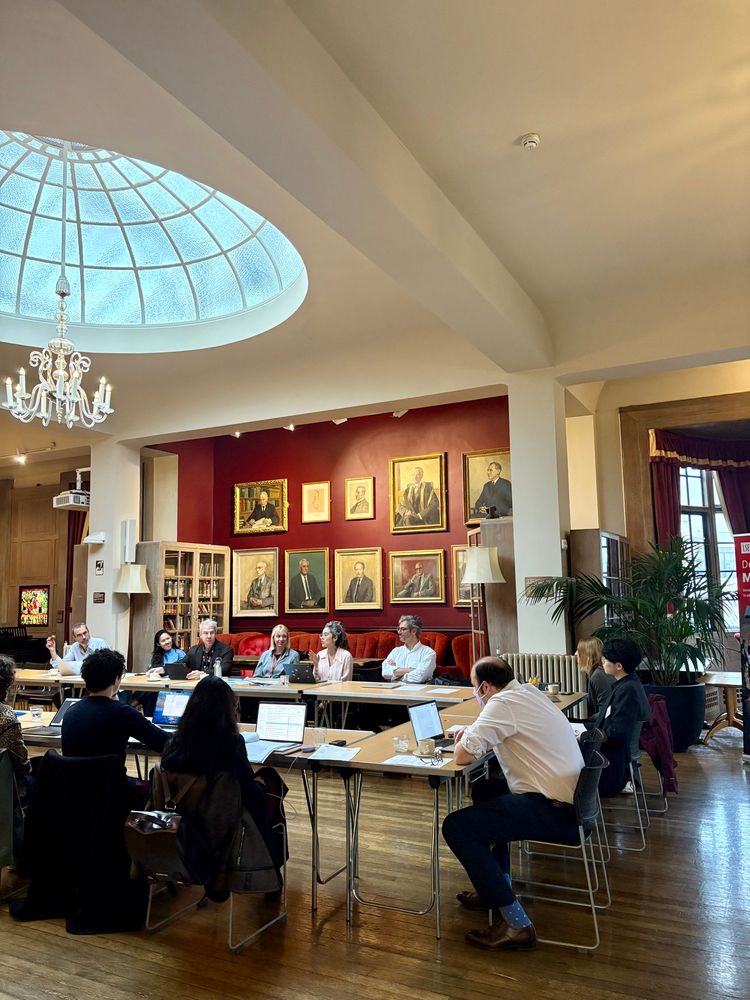
People sat around a table in a grand room
Day Two of our Computational
Social Science Meets
Qualitative Research workshop has begun and we’re in the iconic Shaw Library 📚⚡️
@lsedatascience.bsky.social
14.11.2025 10:53 — 👍 10 🔁 3 💬 2 📌 1
It’s Day One of our Computational Social Science Meets Qualitative Research workshop ✍️
We kicked things off with the first paper from @audreyalejandro.bsky.social @dandekadt.bsky.social 💡
13.11.2025 10:42 — 👍 15 🔁 6 💬 1 📌 0

The secret is that one deceptively simple question addresses all of these problems at once: “What is this a case of?”.
This isn’t just a philosophical musing — it’s a powerful, generative tool that can supercharge your research approach. Asking this question yields four key benefits:
1. It forces you to situate your project within a broader universe of comparable cases, leading to more rigorous case selection.
2. It helps you identify conceptual anchors for your literature review beyond case-specific sources.
3. It pushes you to develop a conceptual toolbox that sharpens your analysis.
4. It allows you to make a double contribution — both to those interested in your empirical case and to those working on broader conceptual or theoretical questions.
In short, asking “What is this a case of?” is a strategic, epistemological, and practical move. It transforms a descriptive project into an analytical one — bridging your phenomenon and theory to produce richer, more meaningful results.
08.09.2025 09:23 — 👍 1 🔁 0 💬 0 📌 0
📭 Just published: The Case for Asking “What Is This a Case Of?”
My students pushed me to write this — maybe yours will find it useful too.
Curious what you think!
#caseselection #methodology #researchdesign #researchmethods
www.audreyalejandro.com/the-methodol...
@lsemethodology.bsky.social
08.09.2025 09:23 — 👍 8 🔁 2 💬 1 📌 0
Thank you for the invitation. It was great!
18.07.2025 15:12 — 👍 2 🔁 0 💬 0 📌 0
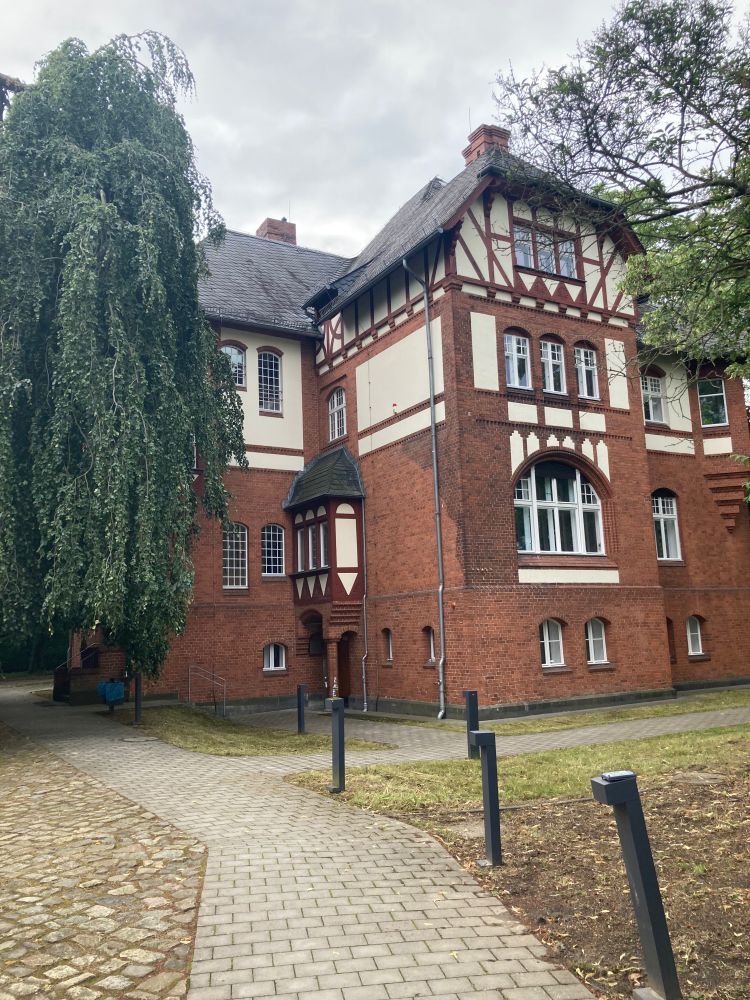
Pic of villa engler
Very nice location for our 4th DiMES workshop today with @audreyalejandro.bsky.social. Thanks to @jojukao.bsky.social for organizing and @dennmis.bsky.social for setting us up in Villa Engler @freieuniversitaet.bsky.social
www.polsoz.fu-berlin.de/en/soziologi...
17.07.2025 06:42 — 👍 7 🔁 1 💬 1 📌 0
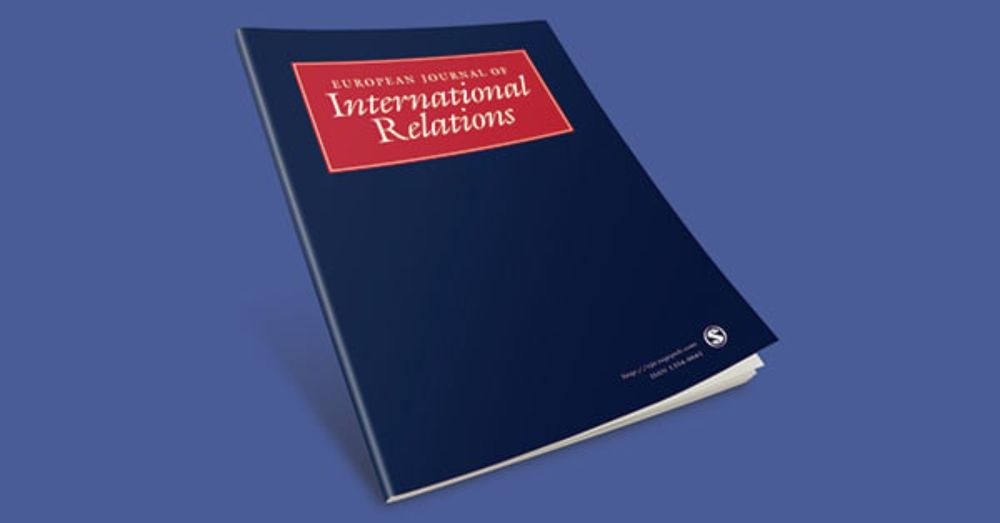
European Journal of International Relations - Volume 31, Number 2
Table of contents for European Journal of International Relations, 31, 2
Summer is there with a new issue of the European Journal of International Relations- Vol. 31, issue 2!
🧵In this thread you can find all the articles included:
📚Read the full issue here: t1p.de/0grt2
10.07.2025 09:43 — 👍 3 🔁 1 💬 1 📌 0
Sage Journals: Discover world-class research
Subscription and open access journals from Sage, the world's leading independent academic publisher.
🧵4/10
“Conceptualizing technicization: the history of the medicalization of male circumcision” by @audreyalejandro.bsky.social
t1p.de/7u0eo
10.07.2025 09:43 — 👍 1 🔁 1 💬 1 📌 0
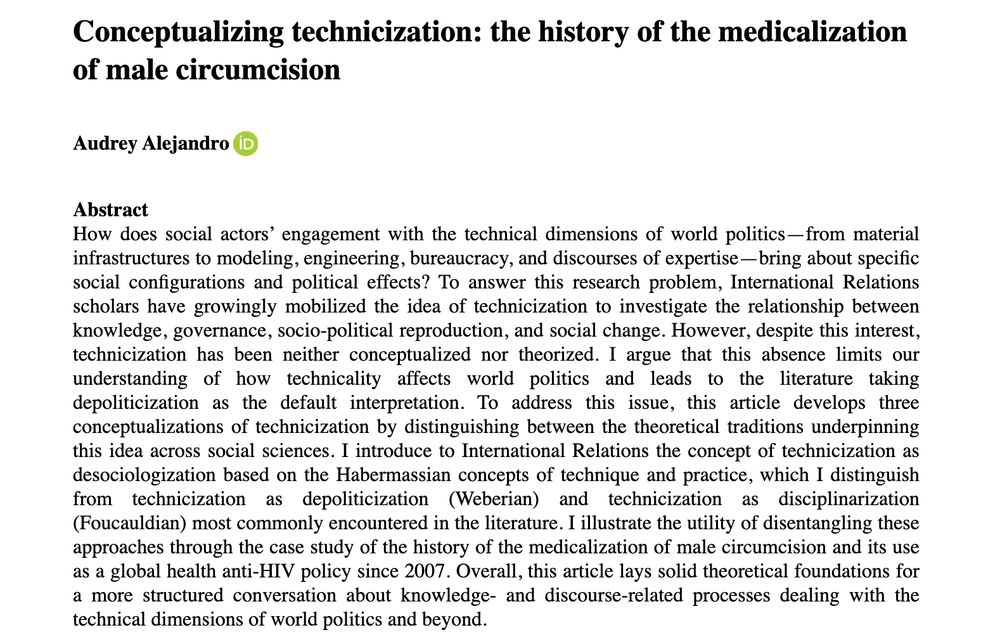
Abstract to the article "Conceptualizing technicization: the history of the medicalization of male circumcision" :
How does social actors’ engagement with the technical dimensions of world politics—from material infrastructures to modeling, engineering, bureaucracy, and discourses of expertise—bring about specific social configurations and political effects? To answer this research problem, International Relations scholars have growingly mobilized the idea of technicization to investigate the relationship between knowledge, governance, socio-political reproduction, and social change. However, despite this interest, technicization has been neither conceptualized nor theorized. I argue that this absence limits our understanding of how technicality affects world politics and leads to the literature taking depoliticization as the default interpretation. To address this issue, this article develops three conceptualizations of technicization by distinguishing between the theoretical traditions underpinning this idea across social sciences. I introduce to International Relations the concept of technicization as desociologization based on the Habermassian concepts of technique and practice, which I distinguish from technicization as depoliticization (Weberian) and technicization as disciplinarization (Foucauldian) most commonly encountered in the literature. I illustrate the utility of disentangling these approaches through the case study of the history of the medicalization of male circumcision and its use as a global health anti-HIV policy since 2007. Overall, this article lays solid theoretical foundations for a more structured conversation about knowledge- and discourse-related processes dealing with the technical dimensions of world politics and beyond.
🔥 New article "Conceptualizing technicization: the history of the medicalization of male circumcision" published with @ejir.bsky.social in #openaccess: journals.sagepub.com/doi/10.1177/...
@lsemethodology.bsky.social
#Technique #malecircumcision #expertise #Weber #Foucault #Habermas #VMMC
13.03.2025 14:41 — 👍 16 🔁 4 💬 1 📌 0
❤️❤️❤️Amazing! Thank you so much for sharing!! 🤓
17.06.2025 17:32 — 👍 0 🔁 0 💬 0 📌 0
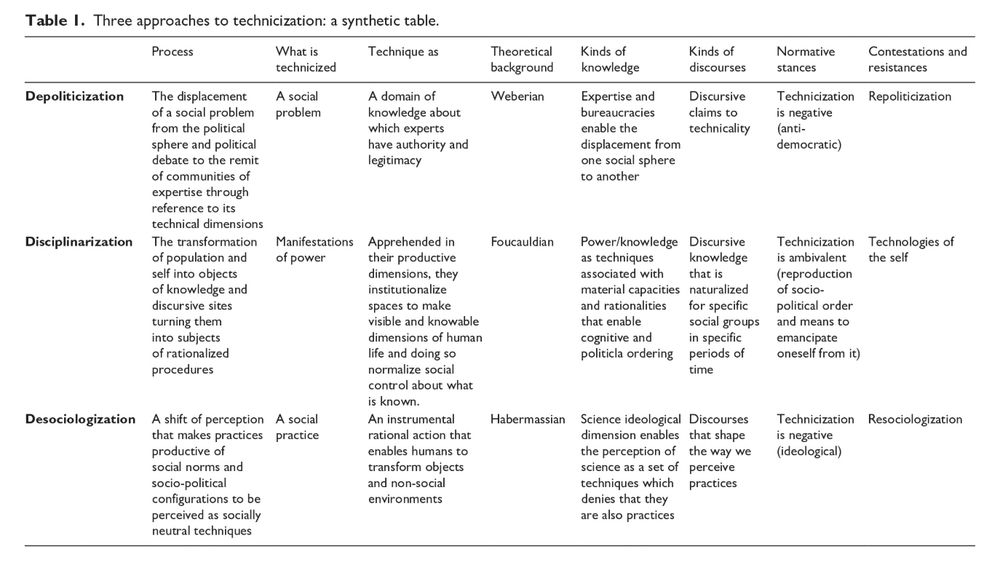
Table synthesising the three conceptualisation of technicization introduced in the article
I develop three conceptualisation of technicization:
1. Technicization as depoliticization (Weberian)
2. Technicization as disciplinarization (Foucauldian)
3. Technicization as desociologization (Habermassian)
It is my first paper that is really a #socialtheory / #politicaltheory paper 😍🤓
13.03.2025 14:41 — 👍 7 🔁 1 💬 1 📌 0
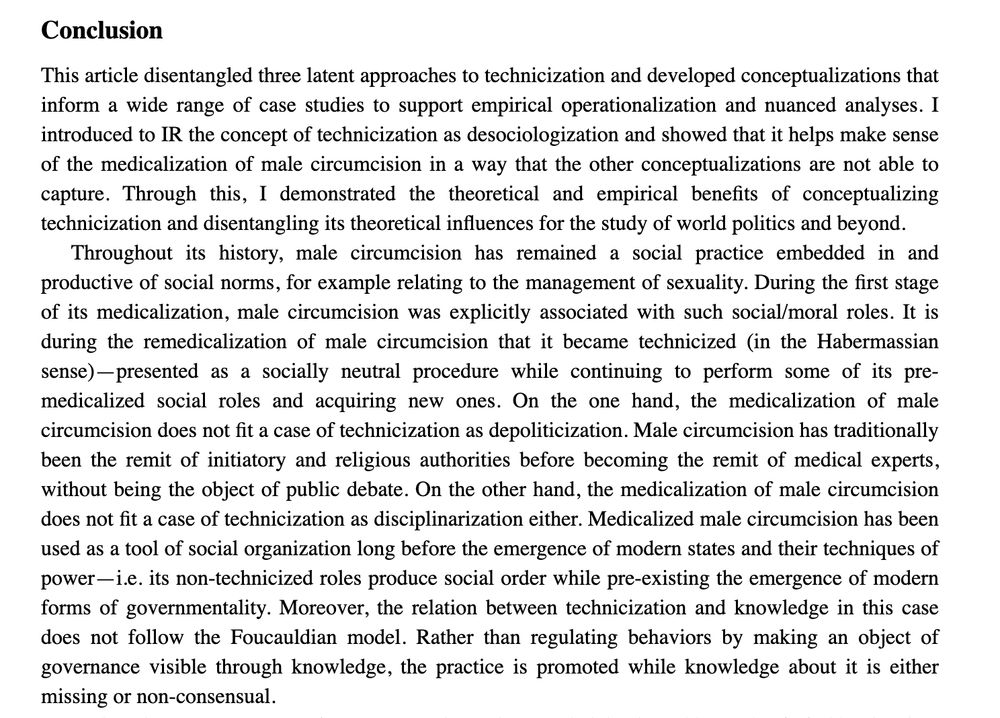
Conclusion
Throughout its history, male circumcision has remained a social practice embedded in and productive of social norms, for example relating to the management of sexuality. During the first stage of its medicalization, male circumcision was explicitly associated with such social/moral roles. It is during the remedicalization of male circumcision that it became technicized (in the Habermassian sense)—presented as a socially neutral procedure while continuing to perform some of its pre-medicalized social roles and acquiring new ones. On the one hand, the medicalization of male circumcision does not fit a case of technicization as depoliticization. Male circumcision has traditionally been the remit of initiatory and religious authorities before becoming the remit of medical experts, without being the object of public debate. On the other hand, the medicalization of male circumcision does not fit a case of technicization as disciplinarization either. Medicalized male circumcision has been used as a tool of social organization long before the emergence of modern states and their techniques of power—i.e. its non-technicized roles produce social order while pre-existing the emergence of modern forms of governmentality. Moreover, the relation between technicization and knowledge in this case does not follow the Foucauldian model. Rather than regulating behaviors by making an object of governance visible through knowledge, the practice is promoted while knowledge about it is either missing or non-consensual.
I illustrate the interest of theorising and disentangling these conceptualisation of #technicisation based on the case study of the history of the medicalisation of male circumcision.
13.03.2025 14:41 — 👍 1 🔁 1 💬 1 📌 0
Yes, have you published on discourse?
04.04.2025 06:20 — 👍 0 🔁 0 💬 1 📌 0

graphic that reads 'we're hiring: LSE Fellow in Qualitative Methods. Applications close: 27 April 2025. For more information and to apply, please visit www.jobs.lse.ac.uk'
We're also hiring an LSE Fellow in Qualitative Methods👏
We are seeking to appoint an individual with established research interests and teaching experience in qualitative methods 🌎
For more info and to apply➡️ jobs.lse.ac.uk/Vacancies/W/...
03.04.2025 15:08 — 👍 4 🔁 2 💬 1 📌 1
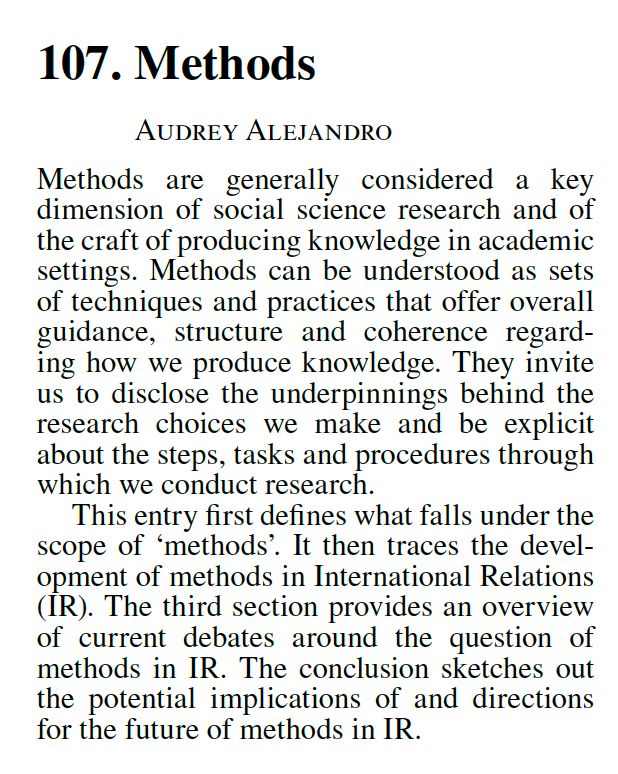
Methods are generally considered a key dimension of social science research and of the craft of producing knowledge in academic settings. Methods can be understood as sets of techniques and practices that offer overall guidance, structure and coherence regarding how we produce knowledge. They invite us to disclose the underpinnings behind the research choices we make and be explicit about the steps, tasks and procedures through which we conduct research.
This entry first defines what falls under the scope of ‘methods’. It then traces the development of methods in International Relations (IR). The third section provides an overview of current debates around the question of methods in IR. The conclusion sketches out the potential implications of and directions for the future of methods in IR.
Based on the history of methods & methodological debates in IR, I argue that the current promotion of methods in IR challenges the ‘critical vs non-critical’ divide & argue that pro-methods critical scholarship is currently engaged in a process of de-technicisation of methods.
25.03.2025 09:54 — 👍 9 🔁 1 💬 0 📌 0
Just to reiterate, these are really good post-docs: Relatively low teaching load (and the teaching is usually interesting and helpful from a career-perspective), friendly and supportive community, and a focus on helping you produce research and launch a career.
Many very successful alumni!
01.04.2025 10:36 — 👍 21 🔁 11 💬 0 📌 0
📣 Beate Jahn & Sebastian Schindler's new Encyclopedia of #InternationalRelations is OUT!
Very proud to have contributed to the entry "#Methods" that I wrote as an introduction to methods for IR students. DM if you want the manuscript.
www.elgaronline.com/display/book...
25.03.2025 09:54 — 👍 8 🔁 1 💬 1 📌 0

Data Science Institute
Discover the LSE Data Science Institute that leads and forms the institutional cornerstone of activity in data science at the London School of Economics
Happy to have become an affiliate of LSE Data Science Institute & pursue there my interest in building the bridge between Computational Social Science and Qualitative Research 🎉 Have a 👀 at this wonderful team of scholars: www.lse.ac.uk/DSI
@lsedatascience.bsky.social @lsemethodology.bsky.social
26.03.2025 10:43 — 👍 13 🔁 2 💬 1 📌 1
Librarian and Liaison Program Lead, PhD candidate, LIS adjunct faculty. Instruction programs, crit info lit, edu policy studies, valuation of library labor, qual methods.
🌱🐈⬛🚲☕️
https://www.nicolepagowsky.com/
European Political Science Review (EPSR) is an #OpenAccess journal of the European Consortium for Political Research (ECPR).
Product mgmt professional and tech/media researcher. Unpopular views m'own.
https://www.researchgate.net/profile/Lorian-Leong
Postdoctoral Researcher at the School of Government, UAI Chile & IMFD | Lecturer at the Department of Sociology, UC Chile | My work integrates: #computationalsocialscience #statisticalmethods #socialnetworks #textdatamining #culturalsociology #socialtheory
Sociologist with a historical focus and an anthropological method.
PhD candidate @CSEES UniGraz | visiting researcher ZRC SAZU
Vienna, Ljubljana and everything Balkans.
Nature Reviews Methods Primers publishes Primers - introductory reviews on methods and techniques across the life and physical sciences. https://www.nature.com/nrmp/
Computational Social Science & Science of Science | PhD Student at CU Boulder
Retired nurse lecturer, student, G’pa, socialist, football fan.
Researching Cuban politics with a focus on Cuba’s foreign relations | Interested in Political Economy, Post-colonial theory and Foreign Policy
Continental philosophy
Ereignis Center board member
https://www.ereignis.no/
PhD European Graduate School, University of Toronto
https://dissent.art
Worldly economist @pomonacollege.bsky.social; working on topics at the intersection of economics, ethics, and psychology; PPE and history of thought aficionado 🦜
Official journal of the Australian Political Studies Association (@auspsa.bsky.social). Find us at https://www.tandfonline.com/journals/cajp20
Professor, international political economy, corporations, CSR/ESG politics, cat lover, wannabe mando player
Associate Professor in Management at UCL.
Networks and Organizational Design.
Mostly found reading.
Very occasionally on Youtube: www.youtube.com/@antoinevernet
Helping ambitious people get their first board seats. Regardless of your background.
Professor of Computational Science and Dean, School of Social Sciences, Singapore Management University. Political Scientist and co-founder of the European Political Science Association.
#datascience #rstats, Party politics, #LLMs, political methodology.
Assistant Professor of Political Science at the University of New Mexico, alumna of University of Washington, Northwestern University, and the Center for American Progress.
Postdoc at Simons at UC Berkeley; alumnus of Johns Hopkins & Peking University; deep learning theory.
https://uuujf.github.io
Associate Professor, political scientist, Dep of Government, Univ of Essex, comparative politics in Africa, mixed methods, Visiting Senior Fellow LSE Dep of Methodology; Co-Director @africasigessex; ESRC MCCRA
https://sites.google.com/site/floriangkern

















